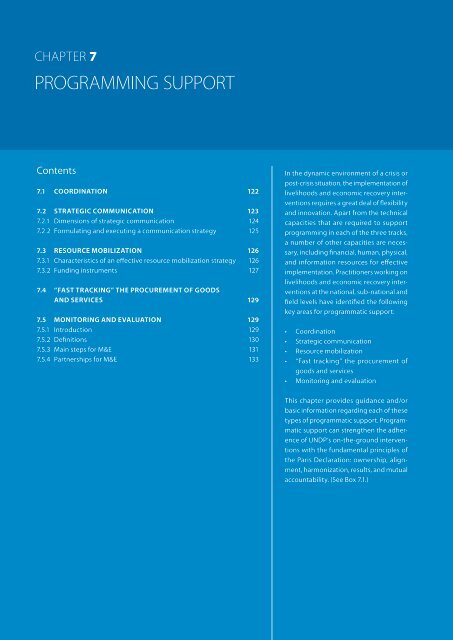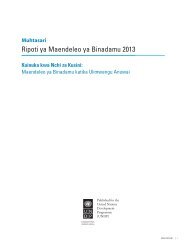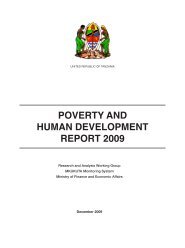Download PDF (4.08 MB) - ReliefWeb
Download PDF (4.08 MB) - ReliefWeb
Download PDF (4.08 MB) - ReliefWeb
You also want an ePaper? Increase the reach of your titles
YUMPU automatically turns print PDFs into web optimized ePapers that Google loves.
CHAPTER 7<br />
PROGRAMMING SUPPORT<br />
Contents<br />
7.1 Coordination 122<br />
7.2 Strategic communication 123<br />
7.2.1 Dimensions of strategic communication 124<br />
7.2.2 Formulating and executing a communication strategy 125<br />
7.3 Resource mobilization 126<br />
7.3.1 Characteristics of an effective resource mobilization strategy 126<br />
7.3.2 Funding instruments 127<br />
7.4 “Fast tracking” the procurement of goods<br />
and services 129<br />
7.5 Monitoring and evaluation 129<br />
7.5.1 Introduction 129<br />
7.5.2 Definitions 130<br />
7.5.3 Main steps for M&E 131<br />
7.5.4 Partnerships for M&E 133<br />
In the dynamic environment of a crisis or<br />
post-crisis situation, the implementation of<br />
livelihoods and economic recovery interventions<br />
requires a great deal of flexibility<br />
and innovation. Apart from the technical<br />
capacities that are required to support<br />
programming in each of the three tracks,<br />
a number of other capacities are necessary,<br />
including financial, human, physical,<br />
and information resources for effective<br />
implementation. Practitioners working on<br />
livelihoods and economic recovery interventions<br />
at the national, sub-national and<br />
field levels have identified the following<br />
key areas for programmatic support:<br />
• Coordination<br />
• Strategic communication<br />
• Resource mobilization<br />
• “Fast tracking” the procurement of<br />
goods and services<br />
• Monitoring and evaluation<br />
This chapter provides guidance and/or<br />
basic information regarding each of these<br />
types of programmatic support. Programmatic<br />
support can strengthen the adherence<br />
of UNDP’s on-the-ground interventions<br />
with the fundamental principles of<br />
the Paris Declaration: ownership, alignment,<br />
harmonization, results, and mutual<br />
accountability. (See Box 7.1.)





